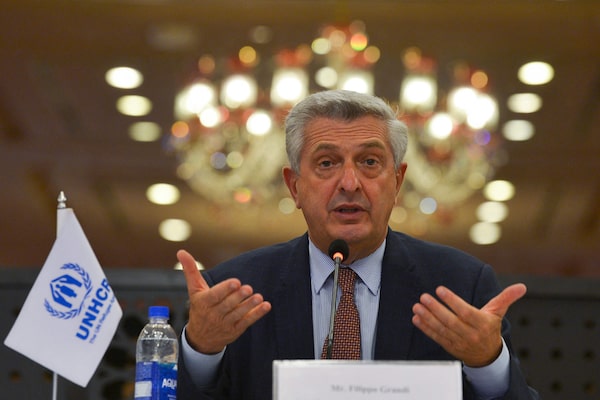
UN High Commissioner for Refugees Filippo Grandi during a news conference in Islamabad on Sept. 17. Opinion polls suggest that only about 14 per cent of Canadians see immigration as a key issue.FAROOQ NAEEM/AFP/Getty Images
A senior United Nations official has called on whomever wins the Canadian election Monday to honour the commitments the governing Liberals have made regarding the resettlement of tens of thousands of Afghan refugees.
Filippo Grandi, the UN High Commissioner for Refugees, praised Canada’s promise to resettle as many as 20,000 Afghan refugees and said he hoped that vow would be implemented regardless of the outcome of the election.
“Whoever will be the prime minister after Monday, the message is quite clear: Let Canada continue to be a strong supporter of refugee operations around the world, one of our major donors. Let Canada continue to have a generous resettlement program, including of Afghan refugees,” Mr. Grandi said in the Pakistani capital, Islamabad. “I hope that whichever government comes out of the election will hold on to this important promise.”
Immigration has not been a major topic in the election campaign thus far. The Conservatives have said they support the Liberal plan to take in vulnerable Afghans. The NDP are calling for an expansion of the Liberal plan to have a specific focus on women and girls and include human rights activists and Afghans with family members in Canada – especially for those with family reunification applications still awaiting processing.
Opinion polls suggest that only about 14 per cent of Canadians see immigration as a key issue; health care, climate change and the economy are primary concerns.
However, the next government will have the job of honing promises regarding Afghanistan into actual policies – and funding them. Under the Caretaker Convention, which requires that the government “confine itself to necessary public business” during an election campaign, statements made by Liberal Leader Justin Trudeau, Immigration Minister Marco Mendicino and others since the start of the campaign are treated only as promises made by candidates for office, not government declarations.
Mr. Trudeau called the election on Aug. 15, the same day the Taliban took control of Kabul.
The threat of Taliban retribution prompted a panicked exodus of Afghans who had worked with NATO during its 20-year occupation of Afghanistan. The Canadian military evacuated about 3,700 Canadian citizens, as well as former military translators and their family members, via Kabul’s airport before the last U.S. troops left on Aug. 31. But thousands more were left behind in the chaotic withdrawal.
In addition to Afghans who served the Canadian military, vulnerable groups who qualify for resettlement under special measures announced by Mr. Mendicino on Aug. 14 include women, LGBTI individuals and persecuted minorities, as well as human-rights workers and journalists.
A page on the Immigration, Refugees and Citizenship Canada website says that, as of Sept. 12, applications covering 12,400 people had been received under the program to resettle vulnerable Afghans and that 8,200 had been approved. So far, 2,200 new Afghan refugees have reached Canada, with another 800 currently in COVID-19 quarantine.
Mr. Grandi said the Canadian program was also an “important signal” to Pakistan, which according to the UNHCR is host to about 1.4 million Afghan refugees after a succession of conflicts, including the Soviet Union’s 1979 invasion of Afghanistan and a bloody civil war in the 1990s. While that number was once closer to four million – many Afghans returned home during the two-decade NATO military presence – Pakistan’s government has signalled that it is not willing to take in another mass influx now that the Taliban have returned to power.
Canada’s “resettlement is not very big in numbers but is a very important signal to a country like Pakistan that has hosted millions [of Afghan refugees] for 40 years – that at least there is some sharing of responsibility, some sharing of the burden. Giving money is one thing, but also taking some of the refugees is important,” Mr. Grandi said. “In recent years, we were almost unable to resettle any Afghan refugees from Pakistan. I hope that now there is more awareness of the situation and that this burden will be shared more generously – and that Canada will give the example, as it often does.”
Mr. Grandi made his remarks after a three-day trip to Afghanistan during which he met with senior Taliban leaders, including the interim government’s ministers of foreign affairs, education, rural development and refugee affairs.
Many Western countries – and all three of Canada’s largest political parties – have said they will not recognize or send aid to the Taliban government, which is dominated by hard-line figures associated with the extremist group’s brutal rule in the 1990s and attacks on NATO forces over the past 20 years. However, Mr. Grandi said it was critical that political considerations not get in the way of humanitarian assistance.
“There is international recognition that Afghanistan cannot be left on its own, cannot be abandoned,” he said, as happened when the Taliban last ruled the country and made it a haven for terrorist organizations such as al-Qaeda. “There is a consciousness this time that leaving it on its own will spell disaster, first of all for Afghans, but then for the neighbours – especially Pakistan – and then for the region and beyond.”
With a report from Steven Chase in Ottawa
Our Morning Update and Evening Update newsletters are written by Globe editors, giving you a concise summary of the day’s most important headlines. Sign up today.
 Mark MacKinnon
Mark MacKinnon